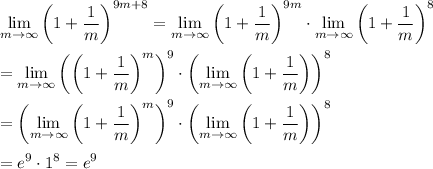Looks like the given limit is

With some simple algebra, we can rewrite

then distribute the limit over the product,

The first limit is 0, since 1/3ⁿ is a positive, decreasing sequence. But before claiming the overall limit is also 0, we need to show that the second limit is also finite.
For the second limit, recall the definition of the constant, e :

To make our limit resemble this one more closely, make a substitution; replace 9/(n - 9) with 1/m, so that

From the relation 9m = n - 9, we see that m also approaches infinity as n approaches infinity. So, the second limit is rewritten as

Now we apply some more properties of multiplication and limits:

So, the overall limit is indeed 0:
